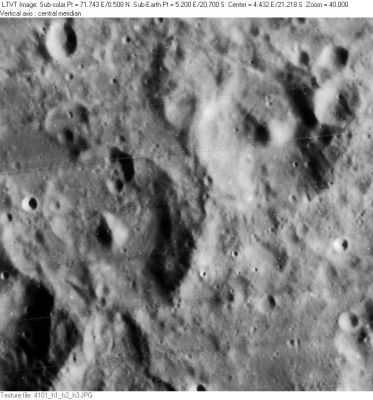Faye
Contents
Faye
|
Lat: 21.4°S, Long: 3.9°E, Diam: 36 km, Depth: 2.7 km, Rükl: 55 |
LO-IV-101H The two similar craters are Faye (left) and Donati (right). The shadowed region in the lower left is the eastern part of 46-km Delaunay.
Images
LPOD Photo Gallery Lunar Orbiter Images Apollo Images
- Although Faye is not mentioned in the LPI's search list for orbital Apollo photographs, it WAS captured on several frames made by Apollo 16's south-looking mapping/metric Fairchild camera, such as frame AS16-M-0707, in which Faye and Donati (and their central peaks) are noticeable near the central part of the curved horizon.
- Research: Danny Caes
Maps
(LAC zone 95B4) LAC map Geologic map
Description
Description: Elger
(IAU Directions) FAYE.--The direction of the chain swerves considerably towards the W. at this formation, which resembles Donati both in size and in irregularity of outline. The wall, where it is not broken, is slightly terraced. There is a craterlet on the S. rim and a central crater in the interior.
Description: Wikipedia
Additional Information
Depth data from Kurt Fisher database
- Westfall, 2000: 2.7 km
- Viscardy, 1985: 2.37 km
- Cherrington, 1969: 2.37 km
- From the shadows in LO-IV-101H, the central peak of Faye is 1400 m tall. There is a 1-km diameter crater at its summit. The central peak of Donati is about 1300 m tall. - JimMosher
- The central peak is 1.0 km tall Sekiguchi, 1972. - fatastronomer
Nomenclature
- Hervé Auguste Étienne Albans Faye (October 3, 1814 – July 4, 1902) was a French astronomer who worked at the Paris Observatory. He advanced several original theories on the nature and form of comets, meteors, the aurora borealis, and the sun. Today in Astronomy biography
- According to Whitaker (p. 221), this name was introduced by Birt and Lee.
LPOD Articles
Bibliography
A certain Faye in the Sourcebook Project (William R. Corliss)
- In Mysterious Universe, a handbook of astronomical anomalies (1979) :
- Page 46: A Supposed New Interior Planet (Monthly Notices of the Royal Astronomical Society, 1859).
- Page 541: Law Connecting Motions in Planetary System (Nature, 1899).
Note: is this (or are these) the same Faye as the one mentioned in the Nomenclature section above? - DannyCaes Apr 11, 2015
